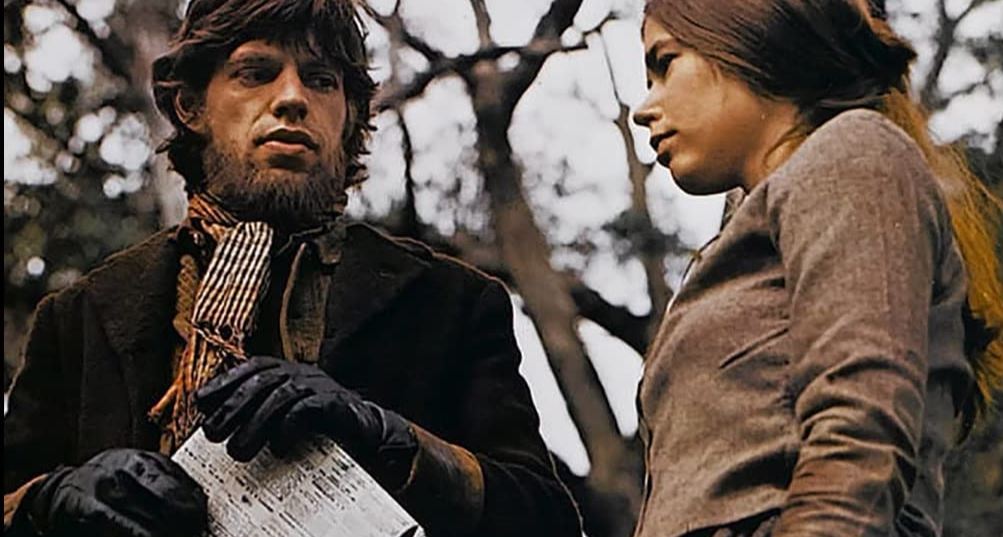
Jagger in Performance (1970) & Ned Kelly (1970)
Art and commerce have a weird relationship. On the face of it, it makes perfect sense to slap a pop star into a feature film, sit back and watch his or her fans gobble up the tickets. Who needs marketing when you’ve got a built-in audience? Such an approach worked a treat for the likes of Presley, Prince and The Spice Girls (whose slapdash Spice World is more of an example of commerce than art).
So why didn’t it work with Jagger? Why do some pop stars like Britney Spears and Mariah Carey fall flat on their pretty faces? After all, at the beginning of the 70s, Jagger was white hot, a gossip column mainstay, an artist at the peak of his startling powers, and a lightning rod for controversy, the counterculture and rug-wrapped, naked ladies. Perhaps the financial failures of Performance and Kelly were down to the flicks not being very good. But, hang on, Purple Rain and Spice World were not very good. Maybe Jagger’s efforts were too weird, dark and experimental for mainstream taste. Then again, poor distribution and advertising could have scuttled them. Whatever the case, the man couldn’t have done much worse in trying to kick-start a movie career.
Performance, actually filmed in 1968, is by far the weirder of his early efforts. It starts by crosscutting images of a supersonic jet flying overhead, a Rolls Royce traveling through the serene English countryside, lots of thrusting arses, and naked women being slapped and choked to a discordant score. In other words, it’s not hard to tell this one’s a wee bit fucked.
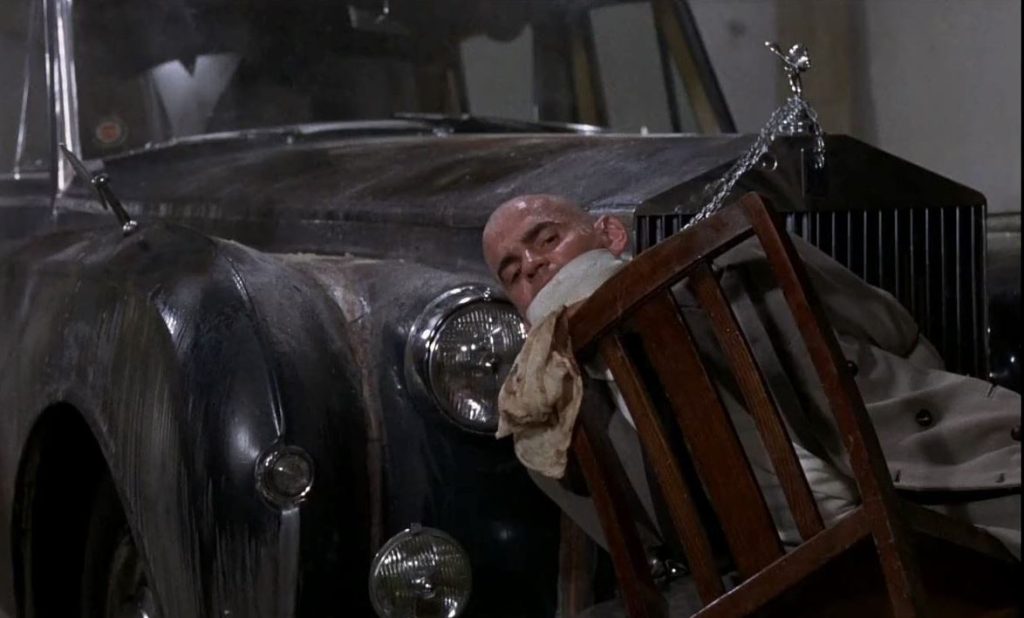
Indeed, its arty directorial choices and rapid-fire editing will either fascinate you or turn you right off. Now I don’t normally go in for pretentious or avant-garde stuff, but Performance has a definite feel. It has a tremendous opening half-hour and is so strange at points that it’s impossible to be bored. I also imagine its depiction of wisecracking but slightly dim and sadistic gangsters complaining about TV violence or looking at homosexual porn influenced Tarantino and especially Guy Ritchie’s early work. The goddamn thing has mighty big balls, all right, but whether it holds together is another matter.
The slim, good-looking (but old-fashioned) James Fox is a ‘mad dog’ gangster who steps on the toes of his London boss once too often, forcing him to improvise and hide out at the mansion of a reclusive rock star. Here we meet Jagger, who utilizes his extraordinary face and somnolent, debauched demeanor to maximum effect. Christ, just watch him perform the excellent song Memo from Turner. He’s like an incarnation of a drugged-up, shagged-out Pan, giving the impression he’s tried all Earthly perversions and long wearied of them. This lethargy is reflected in his speech. He might read aloud from literary texts but barely manages to say anything coherent. Not that he has to while indulging in threesomes on his four-poster bed or wandering around his darkened, bohemian, heroin-haunted micro-world plastered in wet five-pound notes. The hard as nails Fox isn’t impressed with Jagger’s ‘freak show’, anyway. “Comical little geezer,” he tells this satanic beatnik. “You’ll look funny when you’re fifty.”
Now while the extraordinary Performance is ahead of its time, it might just be a load of weird bollocks. The handsome-looking Ned Kelly, on the other hand, is simply a load of tension-free bollocks. Still, it shows what allure Jagger had in that this was only his second feature film and he was already being teamed with an Oscar-winning director. Unfortunately, Jagger’s miscasting, and writer-director Tony Richardson’s jumpy, uninvolving screenplay and half-jokey approach, severely undermine the gritty nature of this real-life tale. This should be a dynamic story of mistreatment, multiple cop killings, bank robberies, bushranger life and an execution yet far too often we’re left listening to a plethora of leaden folk songs or watching Jagger look awkward on horseback. He’s supposedly portraying a charismatic, feared outlaw but his slight stature, unconvincing beard and wavering Irish accent instead somehow manage to give the impression of an effete Amish leprechaun. Performance showed he could project a strong whiff of decadence and corruption, but when it comes to bare knuckle brawling and the tough guy stuff he’s about as convincing as Sinatra.
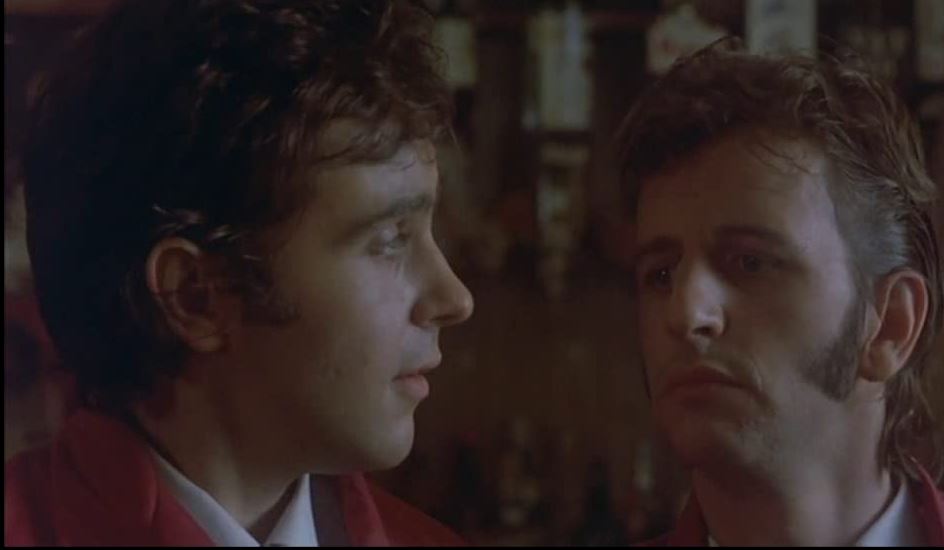
David Essex in That’ll Be the Day (1973) & Stardust (1974)
I went into the PG-rated Day expecting a nice little coming of age story set in late-50s Britain. Instead, I got the handsome, husky-voiced, outwardly affable David Essex going from virgin schoolboy to schoolgirl rapist. Indeed, this is a study in misogyny in which Essex can’t even give his mum a fair shake.
Essex plays the teenage Jim MacLaine. Instead of sitting his university-entrance exams, he runs away to the seaside to become a deckchair attendant. He’s clever but alienated and shiftless, perhaps the result of an absentee father. At the seaside he meets the older Mike (a surprisingly good Ringo Starr), a man that isn’t exactly a role model when it comes to honesty and chivalry (“The one with the big knockers is mine!”) In fact, Mike is a super horny Teddy Boy who plays crazy golf because it’s ‘good practice for getting things into holes.’
Bit by bit, Jim’s behavior worsens. Despite his success with the ladies, there’s no joy in him. He’s a coward, a man out for himself, and an increasingly cocky drifter. Essex isn’t the most energetic performer but he captures a disaffected quality and makes a good fist of disguising a contemptible character in this low-key, melancholy drama. Like the later Quadrophenia, it offers excellent period detail.
Day’s sequel, Stardust, also became a hit. It’s now 1963, Kennedy’s just been offed, and Jim has started a band. This seems like a good move in that not too long later he’s enjoying a threesome with two busty blondes and buying a Spanish castle. Day was rooted in kitchen sink realism, but Stardust feels more like a wannabe musician’s fantasy, especially the speed with which Jim gets noticed by a record label and played on the radio. Plausibility isn’t helped by all his songs being crap. Despite the good direction and R rating, Stardust struggles with its uneven script, Essex’s much weaker performance, and an absence of engaging characters. Mind you, I won’t be forgetting a disgruntled Jim feeding an acid tab to a mate’s pregnant Airedale Terrier in a hurry.

Bowie in The Man Who Fell to Earth (1976), The Hunger (1983), Merry Christmas, Mr. Lawrence (1983) & Labyrinth (1986)
Bowie always had an otherworldly quality so playing a humanoid alien in his feature film debut was a smart move, especially given he’d been practicing for a good couple of years as Ziggy Stardust. In fact, his deathly pale skin, different coloured eyes, androgynous persona, hairless, stick-thin body, air of detachment and pronounced lack of threat occasionally manage to suggest Bowie isn’t acting. So, he’s perfectly cast in Man Who Fell to Earth, but I can’t work up much enthusiasm for anything else in Nicolas Roeg’s wonky, earnest and overlong sci-fi drama. The acting across the board is sub-par. Bowie has precious little to do or say in this tale of corruption, defeated by the meandering, disjointed narrative and array of irrelevant scenes. Even with the graphic nudity, it’s a pretentious, turgid mess, although many see it as Bowie’s best film.
Better is the sleek, Goth-tinged The Hunger, a moody flick that plays like some stylish horror pop video, complete with billowing lace curtains, dry ice, fluttering doves, plentiful silhouettes, curling cigarette smoke and rain-spattered window panes. Like Man Who Fell, Bowie is another unearthly creature obsessed with appearance. Here he’s a two-century-old, rapidly aging vampire attacking roller-skaters and murdering violinists in a bid to salvage his not-quite eternal youth. It’s no good, though.
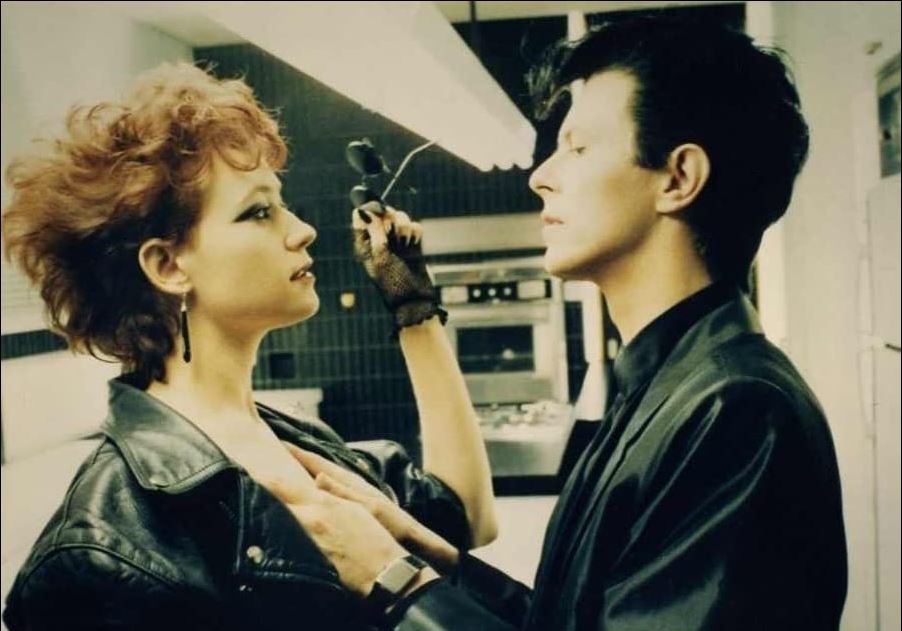
Twenty minutes earlier he’d been an ultra-cool nightclub patron picking up a hot chick and enjoying a face full of titties, but now his hair has fallen out, he’s covered in liver spots and he’s barely got the strength to get out of his chair. “You said forever,” he tells his vampire-creator Miriam (Catherine Deneuve) with a definite accusatory edge to his hoarse voice. “Kiss me. Think of me as I was.” Bowie might play second fiddle to Miriam’s lesbo antics, but he’s still one of the better aspects of Tony Scott’s directorial debut. The Hunger is all blood and no meat, but Bowie manages to generate a degree of pity during the effective ageing sequences in which he ends up as feeble as Texas Chainsaw’s grandpa.
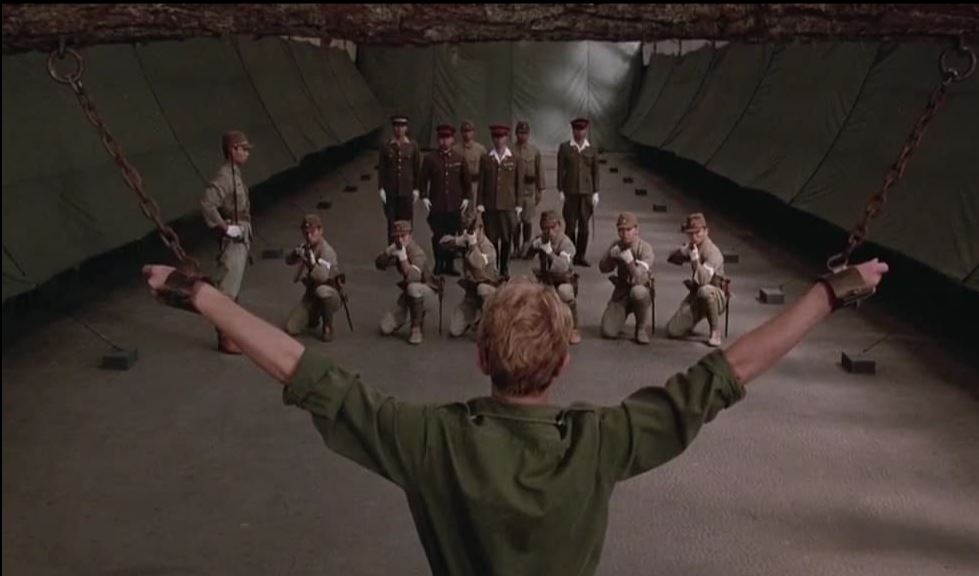
In Merry Christmas, Mr. Lawrence he plays a British soldier captured by those nasty Japs during WW2. Early on he’s described in a courtroom as a ‘very difficult man’. Flipping heck, that’s an understatement. He’s actually the personification of The Stiff Upper Lip.
Or a parody of it.
This is a man who clings to his principles, can stoically bear any ill treatment and is unafraid of death to an extraordinary degree. He’s variously described as a ‘born leader’, ‘soldier’s soldier’ and so on. After a mock firing squad execution (in which he refuses a blindfold and blanks are used) he immediately declares: “That’s a good one!”
If you’re starting to think I don’t have a very high opinion of Merry Christmas, you’d be right. Yes, it’s a sporadically interesting examination of extreme culture clash and unbending mindsets but for a flick set in occupied Java, there isn’t enough action. What violence there is doesn’t convince and the whole thing feels like a stiff, overlong play. At some points, it’s diabolical. Now while Bowie’s gaunt enough to portray an underfed POW, his character comes across as ridiculously obstinate. Plus, there’s a fair bit of unintentional humor in watching him pretend to shave, have an imaginary cup of tea or actually eat flowers in defiance of his captors. The affable Tom Conti (The ‘Lawrence’ of the title) isn’t much better, always bouncing back from the routine abuse he witnesses and suffers. It’s like the movie is trying to tell us that good manners and dignity will wear down and defeat the most monstrous tyranny, even if you end up with a sun-baked head. Bridge on the River Kwai managed to convince with its decorum-at-all-costs-in-the-face-of-adversity schtick, but Merry Christmas just made me long for a Monty Python-style character or two to wander into the throng and break up the over-earnestness.
Unlike his occasional musical collaborator Jagger, Bowie was determined to make it as a movie star. By 1986 he’d already compiled a fair body of work before putting up his hand for Jim Henson’s puppet extravaganza, Labyrinth. In case you don’t know, this is the one where he sings and dances in a puffy shirt and package-revealing gray leggings in a room full of grooving puppets while tossing a baby in the air. Not as cringe-inducing as The Laughing Gnome or trying to lead concert-goers into prayer at the Freddie Mercury Tribute Concert, I know, but pretty damn close.

Bowie’s blank-faced performance is only part of the problem, though. “How are you enjoying my labyrinth?” he asks at one point. Well, to tell the truth, mate, I ain’t. Labyrinth simply isn’t a good movie. It lacks inspiration, feeling both derivative and repetitive. The sets and special effects look cheap. The humor falls flat while the whole thing never comes close to taking flight. Now mysteriously a cult movie with ongoing talk of a sequel, Labyrinth should be buried in the Bog of Eternal Stench.
Its weak, hasty setup sees gawky teenager Jennifer Connelly wish her infant brother away. Goblin King Bowie obliges, forcing her to negotiate the titular maze to get him back, while apparently not caring he’s up to his Motley Crue hairdo in mediocrity. Bowie also contributes a handful of songs in line with his post-Let’s Dance slump before the poorly written Labyrinth drags itself to an underwhelming finale. At least the baby has the good sense to occasionally look embarrassed.
Dave Franklin’s movie guide Go Fuck an Iceberg! A Brit’s Take on Guns, Tits and Other Fun Movie Stuff is now on sale at Amazon.